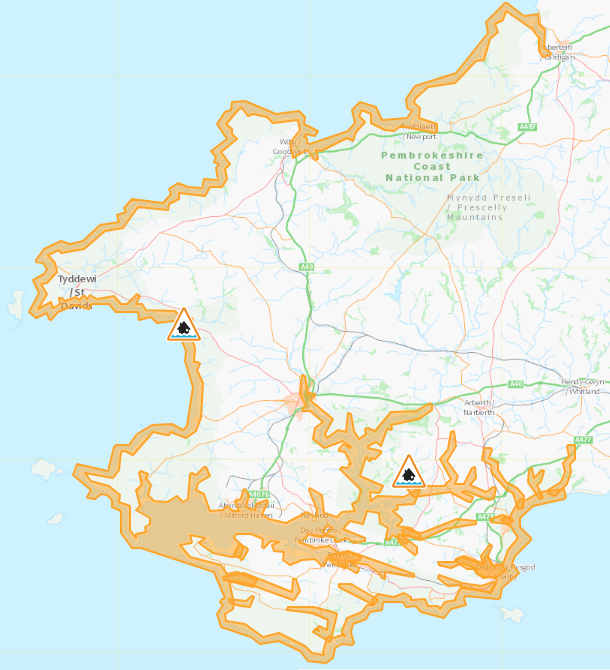News
Judge apologises to Herald journalist, but refuses to revoke press gagging order

THE PEMBROKESHIRE HERALD sent a barrister to Swansea Crown Court today (Friday, May 21) to make an application that a press gagging order made last month during the James Oulton trial be now lifted.
WHY DID THE HERALD GO TO COURT?
This newspaper argues that the judge was wrong in law to make the order, as it represented an “excessive interference with the principle of open justice, and an unwarranted restriction on the newspaper’s right to free expression.”
Editor Tom Sinclair said: “We feel that it is important that all high-profile court cases are covered by the press, and that this reporting should be fair and impartial.
“This means that the newspaper wanted to report on both the prosecution and defence evidence at the James Oulton trial – but we were unable to do so as a press restriction was made halfway through the trial. This meant we could only present the prosecution evidence to our readers.”
“I believe that the order made by the Swansea Crown Court was wrong, and the court could have secured the participation of defence witnesses without a press gagging order.”
“Despite the request for the press restriction coming from Mr Oulton’s own counsel, we feel that this meant that in the eyes of the public the reporting of the case was unfair to him.”
“Although the case is over, with Mr Oulton being acquitted of all charges, it is important that courts and judges know the right way forward for future trials. There are 77 Crown Courts in England and Wales where trials of this type will crop up in the future – because of this we are asking the Royal Court of Appeal in London to decide the matter.”
WHAT HAPPENED IN COURT TODAY?
Former Haverfordwest primary school teacher James Oulton was cleared of 31 charges of sexual touching of pupils, in a case he described as ‘a witch-hunt’, on May 4.
It was not expected that the trial judge would rescind or amend her own press gagging order today, but the hearing at 10am this morning was seen by the newspaper as a steppingstone, its editor said. The matter is now expected to be heard at the Court of Appeal in London very soon.
The press restriction which The Herald is fighting had been requested by James Oulton’s legal team halfway through the trial because he felt that his defence witnesses would feel “uncomfortable” giving evidence if there was publicity about their attendance in court.
There had already been a hearing earlier in the trial by the defence barrister Christopher Clee QC to have the indictment stayed (Case thrown out for abuse of process) over an issue with witnesses, for reasons unrelated to court reporting.
James Oulton was worried that his witnesses would be reluctant to turn up and give evidence of “a good quality” if everything were being reported openly.
A statement was presented to the court with the names of eight defence witnesses – each one giving reasons why they did not want to be named in the press.
The court also had concerns about public comments on Facebook about the trial, some of which had appeared on the Pembrokeshire Herald’s page. The newspaper swiftly acted during the trial to ban public comments on news stories about the case, after being approached by the CPS.
The trial judge said that the social media posts had not impacted the jury as they were mainly from the Swansea area, whilst the newspaper’s readership was in Pembrokeshire.
HERALD ARGUES FOR PRESS FREEDOM
Barrister Matthew Paul, counsel for The Pembrokeshire Herald newspaper, said in court that “it should not be underestimated the difficult position the newspaper was put in by not being able to report on the defence part of the proceedings.”

He said: “The newspaper, which wanted to report on the whole case, took considerable flak over what has been seen as one-sided reporting.
“The 17,000 readers of The Pembrokeshire Herald would be wondering about the mystifying void in place of the reporting of the second part of the trial.”, he added.
The trial judge, Her Honour Judge Catherine Richards, presiding over the application to rescind or amend her own order, said she knew that “emotions had been running high in Pembrokeshire” – and even mentioned in court that the police had held a Gold Command meeting to discuss possible public disorder as the trial was taking place.
APOLOGY BY JUDGE TO HERALD JOURNALIST
Referring to an incident during the trial when a journalist had to be removed from the public gallery over concerns for her safety, Her Honour Richards said: “I am deeply concerned to hear what happened to the Herald’s reporter Ms Carli Newell.
“If I were aware of it, I would have taken steps to ensure that it would have been dealt with immediately.
“The public gallery, although a separate room [connected by video link], is part of the court room for the purposes of the trial and this was clearly unacceptable.”
“I would like to extend an apology to the reporter, and I will ensure that this never happens again.”
Documents submitted to the court explained that some of those in the public gallery had threatened the journalist with violence, been generally obstructive. It was also in evidence that the newspaper had received threatening phone calls and messages warning the newspaper not to report on the trial.

In relation to the application to lift the gagging order made last month, Matthew Paul, for The Herald, questioned whether such a reporting restriction was necessary. He highlighted that press gagging orders should not be imposed “unless there is an overriding need, and no other solutions than making an order, to ensure open justice in a democratic society.”
He said: “The order was imposed for the comfort of the witnesses rather than because that there was evidence of a physical threat to them.
“Witnesses could have been put at ease, for example, by the use of screens in the court room, or by having discussions with the police about how to handle any potential abuse”.
Her Honour Judge Catherine Richards asked Mr Paul if he understood the difference between a prosecution witnesses and a defence witness and securing their attendance at court – to which Mr Paul replied he did. Mr Paul went on to explain that the court had a “battery of weapons to use against a witness who refused to attend.”
Citing case law, he then explained that the higher courts had always sided with the principle of reporting court cases openly, even when there had been difficulties these had been “got around”, he explained.
He told Swansea Crown Court: “The basis on which the order was made was incomplete and did not balance the rights of open justice, and ensuring witnesses attended court without getting hassle.
“And it IS their comfort we are talking about – there is no threat to their lives or property – we must side with open justice.”
Mr Paul said that in making the press restriction during the trial itself, the court had effectively “promised” the witnesses that their names would be kept out of the press and that they had “attended the court on that promise.”
He therefore suggested to Her Honour Judge Catherine Richards that she may consider the second part of his application. Rather than completely rescinding the press restriction, Her Honour could make an Excepting Direction (an amendment to the original order), as a “reasonable compromise” which would keep the “witnesses names and photographs” out of the paper, he suggested, but would allow for “reporting of the rest of the defence case.”
APPLICATION REFUSED BY JUDGE
Mr Paul’s application was, after all, for “revocation of reporting restrictions OR an excepting direction pursuant to section 46 (10) and (11) of the Youth Justice and Criminal Evidence Act 1999”.
At the end of the hearing Her Honour Judge Catherine Richards said: “I do not revoke the order – it was, on the evidence necessary. On the second part of the application, I do not think that an Excepting Direction would be in the public interest, and therefore the application is refused.
Judge Richards said: when making the original order: “The Herald initially reported proceedings with a link to its Facebook page. Some of the comments added were of concern to the defence.
“Those comments required no formal action, but I am satisfied that the witnesses have expressed concern.
“One has been disciplined due to her support of the defendant. I am satisfied that the quality of their evidence is likely to be diminished, and that a restriction is necessary.”
At a previous hearing Judge Richards, who has been a Crown Court Judge since being appointed by The Queen on 27 April 2020, had said that The Pembrokeshire Herald had “rightly and properly” reported on the case.
STATEMENT FROM EDITOR
Speaking after the hearing, Herald editor Tom Sinclair said: “There are many good reasons why some evidence and some details of some cases are subject to reporting restrictions. The law makes those circumstances clear.
“We do not, however, believe that the evidence given in this case met the criteria for such a sweeping restriction.
“That is why we are taking this matter to the Court of Appeal for a definitive ruling on the issues raised by the Judge’s order.
“Court reporting fulfils a vital function. Justice must be seen to be done and reporting what happens in court makes sure it’s seen by as many people as possible.
“Being able to report only one half of proceedings, the unintended effect of HHJ Richards’ ruling, meant we could not do our job of giving our readers the whole story of a difficult and emotionally charged case.
The timing of the Defence’s application meant we had already reported the Prosecution case but were stopped from doing the same for all the evidence given on Mr Oulton’s behalf.
“It’s one thing to ignore an important case, in fact that’s very easy. That’s cowardice. It raises important questions about what else those who fail to report controversy are keeping from the public because they’re afraid to report the whole story.
“When justice takes place behind closed doors, or if it is not reported by the press, it is never seen to be done.
“And that can never be right.”
Community
Flood alert issued for Pembrokeshire coast this evening

Pembrokeshire residents are being urged to prepare for possible flooding along the coastline between St Dogmaels, Cardigan and Amroth, after Natural Resources Wales issued a Flood Alert.
The alert warns that rising water levels could pose a risk to homes, vehicles and livestock, and advises people to take precautions now. Authorities are reminding residents to follow their flood plans, check on family, friends and pets, and ensure essential items and documents are protected.
Residents are also advised to keep mobile phones charged, know how to turn off electricity, gas and water supplies, and prepare a small emergency bag with items such as medication, warm clothing, baby and pet care essentials, and insurance documents. Vehicles, livestock and equipment should be moved from areas likely to flood if possible.
Safety warnings are clear: do not drive or walk through floodwater. Just 30 cm (1 foot) of water can carry a car away, and 15 cm can knock a person off their feet.
For more information, residents can visit Natural Resources Wales – Flood Warnings, check river and sea levels online, or contact Floodline on 0345 988 1188 (quick dial 503013). Updates are also available via @NatResWales on social media.

Crime
Welsh Lib Dems urge ministers to rethink rates relief for struggling pubs and cafés

Calls grow for Welsh Government to match support offered to English venues
THE WELSH LIBERAL DEMOCRATS have urged the Welsh Government to review its business rates policy, warning that scaling back support for pubs and hospitality risks further closures across towns and villages.
Party leader Jane Dodds, who represents Mid and West Wales in the Senedd Cymru, said ministers should act quickly to protect local venues after additional support for pubs and music venues was announced for England by the UK Government.
The measures announced by the Chancellor do not automatically apply in Wales, leaving uncertainty over whether similar help will be introduced here.
Hospitality businesses across Pembrokeshire and Carmarthenshire have already reported rising energy bills, higher wage costs and reduced footfall since the pandemic. From April, current business rates relief is expected to be reduced, a move the Liberal Democrats say could place Welsh firms at a disadvantage compared with competitors over the border.
Dodds said that pubs, cafés and restaurants form “the heart of our communities” and warned that withdrawing relief now would be “a serious mistake”.
She told the Senedd that support “cannot stop at pubs alone” and should extend to the wider hospitality sector, including restaurants and family venues that rely heavily on seasonal trade and tourism.
“When questioned, the First Minister said she needed to examine the details of the English package before committing to anything similar for Wales,” Dodds said. “Without urgent action, we risk losing viable, well-loved businesses that communities simply cannot afford to lose.”
The party is also calling for UK-wide action, including a temporary reduction in VAT for hospitality and tourism, funded by a windfall tax on large banks.
However, Welsh Government sources have previously argued that decisions on rates relief must be balanced against pressures on public finances, with ministers required to prioritise health, education and other frontline services within a fixed budget. They have said any additional support would need to be affordable and targeted.
Industry bodies have echoed concerns about the challenges facing the sector. Trade groups say many independent pubs and cafés continue to operate on tight margins, particularly in rural areas where they serve as community hubs as well as businesses.
Local operators say clarity is now key, with decisions on staffing, stock and opening hours often planned months in advance.
With the next financial year approaching, hospitality owners will be watching closely to see whether Wales mirrors England’s support – or leaves businesses to absorb the extra costs alone.
Community
Lottery boost for HMS Erebus exhibition in Pembroke Dock

Heritage Centre secures £57,015 to mark 200 years since famous polar exploration ship was built in the town
THE PEMBROKE DOCK HERITAGE CENTRE has secured £57,015 from The National Lottery Heritage Fund to create a major new exhibition celebrating the extraordinary story of HMS Erebus, one of the most famous exploration vessels ever built in Wales.
The exhibition, titled HMS Erebus: From Dockyard to Discovery, will open to the public on Monday 8 June 2026, marking exactly 200 years since the ship was launched at Pembroke Dock’s Royal Dockyard.
Constructed in 1826 by local shipwrights, Erebus stands as a powerful symbol of the town’s maritime heritage and the exceptional craftsmanship that once made Pembroke Dock a centre of naval excellence. From its origins in a small Welsh dockyard, the vessel went on to play a central role in some of the most significant expeditions of the nineteenth century.
She later served on the pioneering Ross Antarctic expedition before joining Sir John Franklin’s ill-fated Arctic voyage, where both ships and crew were lost. The dramatic rediscovery of the wreck beneath Arctic waters in 2014 reignited global interest in one of exploration’s greatest mysteries.
For the first time, rare artefacts recovered from the wreck — on loan from the Royal Navy Museum — will be displayed to the British public, offering visitors a direct and tangible connection to life on board and the harsh realities of polar exploration.
The new exhibition will also place Erebus within the wider story of the Georgian dockyard community that built her, highlighting Pembroke Dock’s role in Britain’s naval expansion and the skilled workforce that shaped its history.
Visitors can expect bilingual interpretation, digital interactives, an immersive Arctic diorama with a scale model of the ship, and dramatic underwater footage of the wreck site provided by Parks Canada. The displays will also link historic exploration with modern conversations about climate change and the fragility of polar environments.
Community engagement is central to the project. Local schools will help co-produce elements of the exhibition, while oral histories and shared memories will ensure the story reflects both the past and the present community.
Andrew White, Director of The National Lottery Heritage Fund – Wales, said: “This project will help people better understand Pembroke Dock’s vital role in maritime history while creating new opportunities for communities to engage with their heritage in meaningful and inspiring ways. Thanks to National Lottery players, this exhibition will bring an internationally significant story back to the place where it began, ensuring it is shared with future generations.”
John Evans, Patron of Pembroke Dock Heritage Centre, said: “We are thrilled to receive this support. Thanks to National Lottery players, we can preserve and celebrate a story of national and international importance, while re-establishing Pembroke Dock as a place of discovery, craftsmanship and exploration. By reconnecting HMS Erebus with the community that built her, we hope to inspire pride, learning and long-term cultural and economic benefit for the town.”
HMS Erebus: From Dockyard to Discovery opens on Monday 8 June 2026.
-

 Health4 days ago
Health4 days agoConsultation reveals lack of public trust in health board
-

 News5 days ago
News5 days agoCaldey still unsafe, survivors warn — despite Abbey’s reform claims
-

 Community5 days ago
Community5 days agoPembrokeshire students speak at national Holocaust Memorial Day event
-

 News7 days ago
News7 days agoWales warned against single police force as Lib Dems cite Scotland ‘lesson’
-

 Crime7 days ago
Crime7 days agoMilford Haven man appears in court charged with burglary and GBH
-

 Local Government7 days ago
Local Government7 days agoTribunal over former Neyland councillor’s conduct adjourned
-

 News5 days ago
News5 days agoKurtz raises Gumfreston flooding in the Senedd as petition deadline nears
-

 Community4 days ago
Community4 days agoCampaign to ‘save’ River Cleddau hits over 2,200 signatures
























